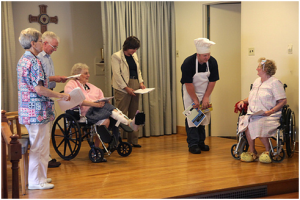Preparing For The Condition as Well as the Person
 Being a caregiver is a job like few others. Most medical professionals are trained to treat diseases and injuries whereas caregivers are trained to treat people. No, a caregiver is not likely to cure your disease or perform life-saving surgery but they serve as the essential supporting cast to keeping people healthy in their daily lives. Therefore it is all the more essential that a caregiver be ready and willing to go beyond the practice of addressing whatever symptoms appear, when they appear. Being an excellent caregiver means not only knowing the nature of the job but the nature of the specific health affliction and the person in front of you. Research and preparation are essential to being an efficient caregiver nowadays because you never know when you will be a helpful hand to help someone move, a counselor for them when they are depressed, or a lifesaver if someone has a fall. Here are some ways caregivers can constantly stay one step ahead of a person’s condition so that they might approach in the most suitable way possible for the individual.
Being a caregiver is a job like few others. Most medical professionals are trained to treat diseases and injuries whereas caregivers are trained to treat people. No, a caregiver is not likely to cure your disease or perform life-saving surgery but they serve as the essential supporting cast to keeping people healthy in their daily lives. Therefore it is all the more essential that a caregiver be ready and willing to go beyond the practice of addressing whatever symptoms appear, when they appear. Being an excellent caregiver means not only knowing the nature of the job but the nature of the specific health affliction and the person in front of you. Research and preparation are essential to being an efficient caregiver nowadays because you never know when you will be a helpful hand to help someone move, a counselor for them when they are depressed, or a lifesaver if someone has a fall. Here are some ways caregivers can constantly stay one step ahead of a person’s condition so that they might approach in the most suitable way possible for the individual.
Research the Medical Condition
If you are assigned to a particular individual or consistently have the same group of people to care for, do some research on their conditions. This will allow you to not only be mentally prepared for the effects of the condition but will also you to better learn how to treat it as well. Certain diseases have mild symptoms so common that one may not recognize them even if a person voices their discomfort. A prime example is a person with Crohn’s Disease. Blood bowels, skin problems, and impaired vision are typical symptoms of Crohn’s but what some common caregivers don’t realize is a form of arthritis called axial arthritis, which can permanently damage the spine, could develop in severe cases and have only one major symptom early on; lower back pain. Extensive research should be done by caregivers so that they know when to raise a red flag if a common symptom appears that might be a sign of something worse.
Make Sure Proper Supplies Are Always Available
I used to always encourage other caregivers to carry mouth covers on them in case they must perform CPR, but in more recent years it has been found that chest compressions alone might be all that is required. Nonetheless, items such as an updated list of medications for an individual, pill cutters, latex gloves, bedside pan, or even incontinence pads should always be readily accessible nearby. Talk to the individual you are caring for and ask them what they commonly need. Monitor their habits as well and see if there is anything you can make more readily available to them that they cannot potentially harm themselves with (i.e. dangerous medication).
If the Condition is Personal, Get Personal
In order to give someone the most effective care possible it is important you have the trust of the person and that they are not afraid to let you know about some of their more personal or embarrassing symptoms. Get to know the person and establish a comfortable relationship that allows them to come to you with any complication like you were a friend or family member. Unreported symptoms are all too common in assisted care facilities and sometimes a friendly gesture can be the difference in saving someone’s life.
Author Info:
Martha June Whitman is freelance healthcare writer and former geriatric caregiver. She enjoys sharing her knowledge and experience in caring for elders in her writing for National Incontinence, a leading supplier of incontinence underwear and poise pads.
LEARN TO LOVE YOUR LIFE AGAIN
 Do you feel like you need to hit the REFRESH button on your life? Download our free guide and begin to create your best life yet!
Do you feel like you need to hit the REFRESH button on your life? Download our free guide and begin to create your best life yet!


